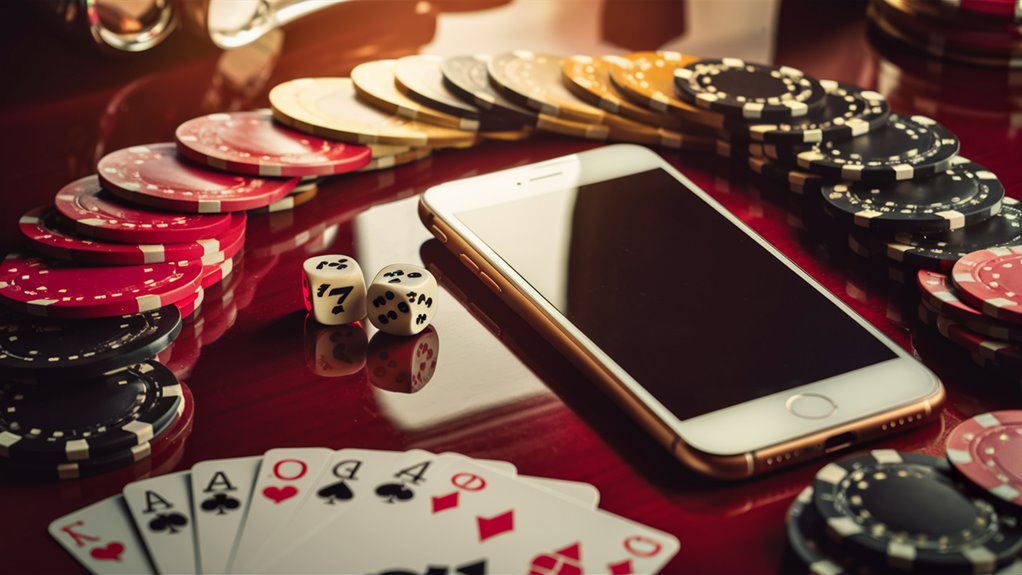How Does Emotional Intelligence Impact Responsible Gambling?
Key Takeaways:
- Emotional intelligence helps gamblers recognize and manage triggers during play
- Self-awareness and impulse control are critical for maintaining healthy gambling habits
- Understanding emotional responses leads to better decision-making while gambling
Understanding the Emotional Intelligence-Gambling Connection
Emotional intelligence in gambling involves recognizing, understanding, and managing emotions during betting activities. This critical skill helps players maintain control over their gambling behavior by identifying emotional triggers before they lead to problematic decisions.
Core Components of Emotional Intelligence in Gambling
- Self-awareness
- Recognition of emotional states while gambling
- Understanding personal triggers and risk patterns
- Identifying when emotions are affecting betting decisions
- Self-regulation
- Managing impulses during wins and losses
- Maintaining composure in high-pressure situations
- Setting and sticking to predetermined limits
- Social awareness
- Reading environmental cues in gambling settings
- Understanding the impact of peer pressure
- Recognizing predatory marketing tactics
Practical Applications for Responsible Gambling
- Monitor emotional states before, during, and after gambling sessions
- Develop specific strategies for handling both wins and losses
- Create and maintain firm boundaries for time and money spent
- Practice mindfulness techniques during gambling activities
- Establish support systems for accountability
Building Emotional Intelligence Skills
- Practice emotional awareness exercises
- Keep a gambling diary to track emotional patterns
- Set clear boundaries before gambling sessions
- Learn stress management techniques
- Develop healthy coping mechanisms
Warning Signs of Emotional Dysregulation
- Chasing losses impulsively
- Gambling to escape negative emotions
- Hiding gambling activity from others
- Continuing despite negative consequences
- Difficulty stopping when planned
Understanding Emotional Intelligence Fundamentals

What Is Emotional Intelligence and How Does It Impact Decision-Making?
Key Takeaways
- Emotional intelligence combines self-awareness, self-regulation, motivation, empathy, and social skills
- Understanding emotional triggers helps prevent impulsive decisions
- Self-awareness enables better control over responses to challenging situations
- Regular emotional pattern recognition supports rational choice-making
Understanding the Core Components
Emotional intelligence centers on recognizing, understanding, and managing emotions – both our own and others’.
This fundamental skill affects decision-making across all aspects of life, from personal relationships to professional choices. The five key components – self-awareness, self-regulation, motivation, empathy, and social skills – work together to create emotional competence.
Applying Emotional Intelligence in Practice
Self-awareness serves as the foundation for emotional intelligence development.
When facing important decisions, emotional awareness helps identify triggers that might lead to impulsive choices. For example, recognizing feelings of anxiety or frustration allows for a pause before acting, enabling more strategic responses rather than emotional reactions.
Building Better Decision-Making Skills
Developing emotional intelligence strengthens decision-making capabilities through:
- Recognition of emotional triggers
- Assessment of emotional responses
- Implementation of regulation strategies
- Maintenance of rational thinking patterns
Regular practice of emotional awareness leads to improved self-regulation and more considered choices based on logic rather than immediate emotional impulses.
This systematic approach helps develop stronger decision-making skills over time.
Self-Awareness in Gambling Decisions

How Can You Build Self-Awareness in Your Gambling Habits?
Key Takeaways
- Regular self-monitoring of emotions helps identify gambling triggers
- Keeping a gambling diary tracks patterns and responses
- Self-assessment questions reveal potential problematic behaviors
Understanding Your Emotional Triggers
Self-awareness in gambling decisions starts with monitoring your emotional state throughout the betting process.
By tracking your feelings before, during, and after gambling activities, you can identify specific triggers that influence your betting choices and recognize patterns that might indicate problematic behavior.
Implementing a Gambling Diary
A gambling diary serves as a practical tool for emotional tracking and pattern recognition. Record:
- Your emotional state when placing bets
- Feelings after wins and losses
- External factors influencing gambling decisions
- Amount spent and time invested
Essential Self-Assessment Questions
Ask yourself these critical questions regularly:
- Am I gambling with disposable income only?
- Are my other responsibilities being neglected?
- Do my gambling activities cause guilt or anxiety?
- Am I chasing losses or gambling to escape stress?
Taking Action Through Awareness
Turn self-awareness into actionable steps:
- Set strict financial limits before gambling
- Schedule regular self-assessment check-ins
- Document emotional patterns in your gambling diary
- Seek support if concerning patterns emerge
This structured approach to self-awareness enables you to maintain control over gambling behavior and make decisions aligned with your financial and personal wellbeing goals.
Recognizing Gambling Behavior Patterns

How Can You Identify Problematic Gambling Patterns?
Key Takeaways
- Track betting habits through a gambling diary to identify triggers
- Monitor emotional states that influence gambling decisions
- Watch for warning signs like escalating bets and hiding activity
- Document frequency, game preferences, and spending patterns
Understanding Your Gambling Triggers
Gambling behavior patterns become clear when examining your betting habits and routines systematically.
These patterns typically emerge through specific triggers, timing, and emotional states that drive gambling decisions. By documenting when and why you gamble, you can identify whether stress, paydays, or loneliness influence your betting behavior.
Tracking Your Gambling Activity
Maintaining a gambling diary helps reveal crucial patterns in your betting behavior. Record:
- Emotional triggers before gambling
- Bet amounts and frequency
- Feelings after gambling sessions
- Time spent on gambling activities
Warning Signs to Monitor
Several red flags may indicate problematic gambling patterns:
- Increasing bet sizes over time
- Chasing losses with larger bets
- Concealing gambling activities from others
- Borrowing money for gambling
- Preoccupation with gambling thoughts
- Neglecting other life activities
Taking Action
When you notice concerning patterns:
- Review your gambling diary regularly
- Identify emotional triggers and situations
- Set strict betting limits
- Seek support if patterns become problematic
- Consider professional help for persistent issues
Understanding these patterns enables informed decisions about gambling behavior and helps prevent potential problems before they develop.
Managing Triggers Through EI

How Can Emotional Intelligence Help Manage Gambling Triggers?
Key Takeaways:
- Emotional Intelligence (EI) helps identify and manage gambling urges
- Self-awareness techniques prevent impulsive gambling decisions
- Trigger tracking and coping strategies build resilience against gambling temptation
Understanding the EI-Trigger Connection
Emotional intelligence skills directly impact how we respond to gambling triggers.
By developing stronger EI capabilities, you gain the power to recognize and manage emotional signals that typically lead to problematic gambling behavior.
Building Self-Awareness
Monitor your emotional state across three crucial phases:
- Before gambling activities
- During gambling moments
- After gambling episodes
Pay particular attention to:
- Stress levels
- Anxiety symptoms
- Feelings of emptiness
- Environmental factors
Practical Trigger Management Strategies
- Keep a Trigger Journal
- Document emotional patterns
- Record specific situations
- Note time and place of urges
- Practice Self-Reflection
- Ask “What emotion am I experiencing?”
- Identify underlying feelings
- Recognize trigger patterns
- Apply Emotional Regulation Techniques
- Deep breathing exercises
- Mindfulness practices
- Stress management methods
Alternative Coping Methods
When gambling triggers arise, consider these healthier alternatives:
- Call a supportive friend
- Engage in favorite hobbies
- Exercise or physical activity
- Practice relaxation techniques
Building Healthy Gambling Boundaries

How Can You Build Healthy Gambling Boundaries?
Key Takeaways:
- Set specific time and money limits for gambling activities
- Maintain separate accounts for gambling and essential expenses
- Communicate boundaries clearly to friends and family
- Document and review boundaries regularly
Setting Time and Financial Limits
Managing gambling activities starts with establishing clear, measurable boundaries for both time and money.
Choose specific weekly time limits for gambling and track them carefully. For example, you might decide on a maximum of 2 hours per week, scheduled during specific days.
Creating Financial Safeguards
Protect your financial wellbeing by:
- Calculating your monthly entertainment budget
- Allocating only a portion for gambling activities
- Setting up separate accounts for gambling funds
- Never borrowing money or using essential expense funds
- Tracking all gambling 먹튀검증 related spending
Communicating Your Boundaries
Share your gambling limits with:
- Family members
- Close friends
- Gambling buddies
- Support network members
When others know your boundaries, they can help support your commitment to responsible gambling habits.
Monitoring and Adjusting Boundaries
Regular boundary maintenance includes:
- Writing down all established limits
- Reviewing boundaries monthly
- Adjusting limits based on personal circumstances
- Recording any boundary violations
- Analyzing triggers that challenge your limits
Before breaking a boundary, ask yourself: “How will this decision affect my wellbeing tomorrow?”
This self-reflection helps maintain long-term responsible gambling habits.
Social Awareness While Gambling

How Can You Practice Social Awareness While Gambling?
Key Takeaways
- Recognize how betting behaviors affect companions and casino staff
- Monitor others’ comfort levels and reactions during gameplay
- Maintain responsible gambling habits while preserving relationships
- Practice proper gaming etiquette and emotional awareness
Understanding Social Impact
Social awareness in gambling environments means recognizing how betting behaviors affect everyone in the vicinity.
This awareness helps maintain responsible gambling while creating a positive atmosphere for players, companions, and casino staff.
Monitoring Others’ Comfort
Pay attention to companions’ reactions and comfort levels during gambling sessions:
- Watch for signs of discomfort with stakes or duration
- Observe body language and emotional cues
- Suggest breaks when someone shows signs of distress
- Adjust playing style to match group dynamics
Practicing Casino Etiquette
Professional behavior enhances the gambling experience for everyone:
- Maintain appropriate noise levels
- Use respectful language regardless of outcomes
- Control emotional reactions to wins and losses
- Follow proper gaming protocols and procedures
Managing Relationships
Gambling choices can significantly impact personal relationships:
- Keep open communication with family and friends
- Maintain transparency about gambling activities
- Listen to concerns from loved ones
- Balance gambling with other social activities
- Set clear boundaries and limits
Supporting Other Players
Create a positive gaming environment through:
- Offering encouragement during losses
- Celebrating wins appropriately
- Showing respect to dealers and staff
- Helping newcomers understand game rules
- Promoting responsible gambling practices
Recovery and Emotional Regulation

How Can You Regulate Emotions During Gambling Recovery?
Key Takeaways
- Emotional regulation is fundamental for successful gambling recovery
- Mindfulness techniques help manage gambling triggers and urges
- Support networks and tracking tools enhance emotional awareness
- Consistent application of coping strategies leads to better outcomes
Understanding Emotional Regulation in Recovery
Emotional regulation forms the cornerstone of successful gambling recovery, combining self-awareness and practical coping strategies.
When individuals learn to identify and manage their emotions, they develop stronger resilience against problematic gambling patterns.
Recognition of emotional triggers enables the development of preventive measures before urges intensify.
Practical Mindfulness Techniques
- Daily meditation practice
- Regular breathing exercises
- Scheduled gambling session breaks
- Stress level monitoring
- Emotional state check-ins
Building Your Support System
A robust support network significantly enhances emotional regulation capabilities during recovery:
- Professional counselors
- Support group participation
- Trusted friends and family
- Online recovery communities
- Accountability partners
Tracking and Monitoring Progress
Implement these tools to maintain awareness:
- Mood tracking apps
- Recovery journals
- Emotion-trigger charts
- Progress documentation
- Regular self-assessment
Alternative Coping Strategies
Replace gambling with healthy emotional outlets:
- Physical exercise
- Creative activities
- Stress-reduction techniques
- Social connections
- Hobby development
Consistent application of these emotional regulation tools, combined with regular support system engagement, creates a strong foundation for long-term recovery success.
Track your emotional patterns and adjust strategies as needed to maintain steady progress in your recovery journey.










